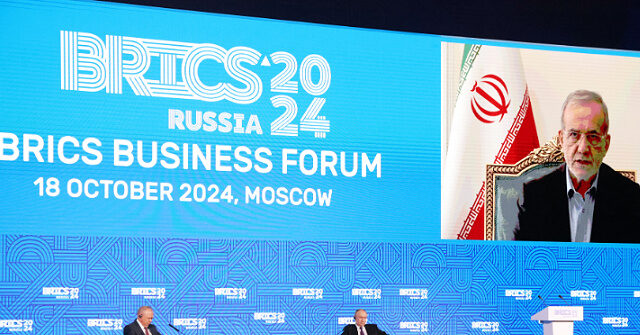The upcoming BRICS summit, led by Russia, is poised to tackle crucial topics including the establishment of a dollar-free parallel economic system, the conflict in Gaza, and the interest of numerous nations in joining the coalition. Scheduled for Tuesday in Kazan with heads of state from influential member nations such as India, China, South Africa, Iran, Egypt, the UAE, and Ethiopia, the summit will notably be without Brazil’s President Luiz Inácio Lula da Silva due to a recent injury. Although Saudi Arabia’s participation is ambiguous, its Crown Prince will not attend, leaving the door open for representation from those nations seeking BRICS membership. Putin has indicated that as many as 34 countries have expressed interest in joining, highlighting the group’s intent to challenge the U.S.-led international order.
The diverse group of BRICS countries often share little more than their opposition to Western dominance, leading to tensions over their varying geopolitical stances. For instance, India remains at odds with China, prioritizing its security interests while maintaining a supportive stance towards Israel amid the Israeli-Palestinian conflict—an issue that divides other BRICS members. With Iran, a strong Hamas supporter, participating in the summit, discussions about the ongoing violence in Gaza are anticipated to dominate the agenda. Iranian officials have articulated their aims to shift international focus on what they perceive as Israeli aggression in the region, particularly in light of the recent escalations. Conversely, India’s clear alignment with Israel has created friction within BRICS, underscoring the complexities of unifying the coalition’s stance on pivotal global challenges.
In addition to contentious discussions related to Gaza, the summit will prioritize establishing financial systems that can circumvent Western sanctions against member nations. Russia, facing substantial penalties limiting its access to global financial networks, emphasizes creating a parallel payment structure to foster economic sovereignty among BRICS. Putin has noted a focus on developing such frameworks before any concrete plans for a BRICS currency, emphasizing a gradual approach to these ambitious financial aspirations. Russian Finance Minister Anton Siluanov has echoed this sentiment, insisting that a robust independent payment system is necessary in the context of increasing geopolitical isolation from Western powers.
Challenges surrounding new member admissions to BRICS also loom large during the summit. Diverging views among current members on this expansion are expected to create debate, especially around whether to grant full membership to countries like Cuba, Zimbabwe, and Ethiopia, which are grappling with severe financial difficulties. Russia has suggested a potential solution by proposing a tiered partnership status for prospective nations, allowing them to collaborate with BRICS without full membership benefits. Chinese state media has emphasized the significance of this topic, aligning it with BRICS’ ambition to consolidate its economic influence on the world stage, particularly as it seeks to rival the G7 in economic output.
Amidst these discussions, the financial positioning of potential new members is under scrutiny, particularly concerning their existing economic stability and whether their inclusion might undermine BRICS’ credibility. Countries like Ethiopia and Egypt are currently facing economic crises, which could diminish the group’s perceived strength. However, other nations, such as Nigeria and Turkey, represent potential sources of diplomatic strength given their international ties and natural resources, signaling that the composition of BRICS could drastically shape its future.
In conclusion, the BRICS summit in Kazan represents a pivotal moment for the coalition as it seeks to assert itself against Western influence, navigate internal disagreements, and expand its global reach. With a full slate of contentious issues on the agenda—spanning from economic structures to opposing geopolitical perspectives—BRICS must reconcile the diverse views of its members while positioning itself as a formidable entity on the world stage. The tangible outcomes of the summit will likely shape the future trajectory of the coalition amidst a rapidly changing international landscape.

